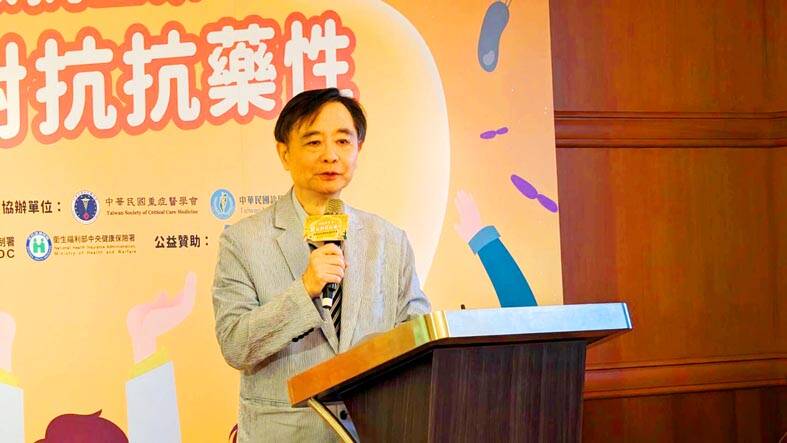Infectious disease experts yesterday raised caution about antibiotic resistance, saying that a bacteria partially responsible for a surge in respiratory illness in China is 60 percent resistant to antibiotics in Taiwan.
On Wednesday, the WHO officially asked China to provide detailed information on an increase in respiratory illnesses.
Chinese authorities attributed the increase to circulation of known pathogens such as influenza, Mycoplasma pneumoniae — a common bacterial infection that typically affects younger children — respiratory syncytial virus and the virus that causes COVID-19, the WHO said.

Photo: CNA
Infectious Diseases Society of Taiwan president Wang Fu-te (王復德) told an event in Taipei that Mycoplasma pneumoniae is an oft-seen infection in Taiwan that occurs year-round.
Zithromax, the antibiotic brand used to treat the infection, is already seeing 60 percent drug resistance in Taiwan, he said.
Hospitals have invested much in personnel and drug costs to combat cancer or in other situations such as surgeries or organ transplants, but drug resistance could reduce the effectiveness of such efforts, he said.
Wang called on the government and academia to jointly work on resolving the issue, suggesting drug management for animals and plants and broader public awareness.
Centers for Disease Control Deputy Director-General Lo Yi-chun (羅一鈞) said that recent monitoring has shown that drug resistance for the Methicillin-resistant Staphylococcus aureus (MRSA) has dropped, while drug resistances for the Gram-negative bacteria-induced infections have increased.
Lo said these conditions have limited doctors’ ability to prescribe medication, adding that if bacteria develop multiple or broad drug resistance and limit effective drugs to one or two kinds, the day when no antibacterial is available might come soon.
He said the government is working with the Ministry of Agriculture and the Food and Drug Administration on a five-year antibacterial agent management plan.
Starting in 2025, the government is to begin limiting the use of antibacterial drugs on multiple fronts and launch a campaign to spread awareness of how misuse of antibacterial drugs could build bacterial drug resistance among the public, Lo said.
National Health Insurance Administration Deputy Director-General Lee Cheng-hua (李丞華) said the government urged doctors to provide feedback on drug usage so that plans and restrictions could be implemented to scale back the ease of obtaining antibacterial drugs.
Additional reporting by Reuters

The Grand Hotel Taipei on Saturday confirmed that its information system had been illegally accessed and expressed its deepest apologies for the concern it has caused its customers, adding that the issue is being investigated by the Ministry of Justice Investigation Bureau. The hotel said that on Tuesday last week, it had discovered an external illegal intrusion into its information system. An initial digital forensic investigation confirmed that parts of the system had been accessed, it said, adding that the possibility that some customer data were stolen and leaked could not be ruled out. The actual scope and content of the affected data

‘LIKE-MINDED PARTNER’: Tako van Popta said it would be inappropriate to delay signing the deal with Taiwan because of China, adding he would promote the issue Canadian senators have stressed Taiwan’s importance for international trade and expressed enthusiasm for ensuring the Taiwan-Canada trade cooperation framework agreement is implemented this year. Representative to Canada Harry Tseng (曾厚仁) in an interview with the Central News Agency (CNA) said he was increasingly uneasy about Ottawa’s delays in signing the agreement, especially as Ottawa has warmed toward Beijing. There are “no negotiations left. Not only [is it] initialed, we have three versions of the text ready: English, French and Mandarin,” Tseng said. “That tells you how close we are to the final signature.” Tseng said that he hoped Canadian Prime Minister Mark Carney

POSITIVE DEVELOPMENT: Japan and the US are expected to hold in-depth discussions on Taiwan-related issues during the meeting next month, Japanese sources said The holding of a Japan-US leaders’ meeting ahead of US President Donald Trump’s visit to China is positive news for Taiwan, former Japan-Taiwan Exchange Association representative Hiroyasu Izumi said yesterday. After the Liberal Democratic Party’s landslide victory in Japan’s House of Representatives election, Japanese Prime Minister Sanae Takaichi is scheduled to visit the US next month, where she is to meet with Trump ahead of the US president’s planned visit to China from March 31 to April 2 for a meeting with Chinese President Xi Jinping (習近平). Japan and the US are expected to hold in-depth discussions on Taiwan-related issues during the

President William Lai (賴清德) yesterday bestowed one of Taiwan’s highest honors on Saint Vincent and the Grenadines (SVG) Ambassador Andrea Clare Bowman in recognition of her contributions to bilateral ties. “By conferring the Order of Brilliant Star with Grand Cordon on Ambassador Bowman today, I want to sincerely thank her, on behalf of the Taiwanese people, for her outstanding contribution to deepening diplomatic ties between Taiwan and SVG,” Lai said at a ceremony held at the Presidential Office in Taipei. He noted that Bowman became SVG’s first ambassador to Taiwan in 2019 and